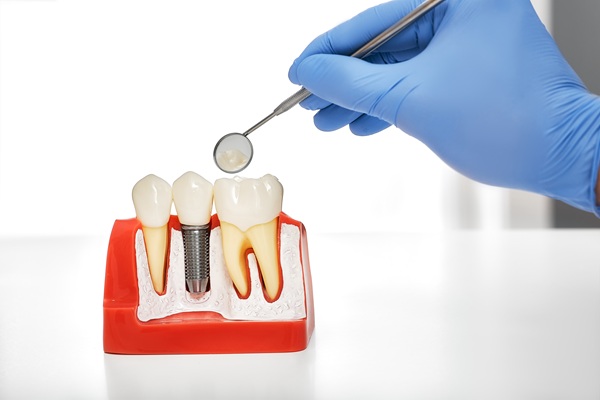Root Canal Therapy Options for a Chipped Tooth

Unfortunately, sometimes a chipped tooth can cause serious problems. It may even require root canal therapy to fix it. If you're unfamiliar with what a root canal is, it may sound a bit overwhelming. However, this procedure is routine, and patients walk away with a brand new smile. In this guide, we will go over root canals to know what choices are available to you. Learning more about this procedure will help you make the appropriate decision for your oral health.
What is a root canal?
You may not know what a root canal is, but rest assured it is a simple procedure that dentists regularly perform. To begin, a dentist will use a small drill to remove decayed or infected parts of your teeth. It’s a mildly invasive procedure that only needs a local anesthetic. After they have cleared the inside of your tooth, they will disinfect it, fill it, and close it up with a crown to prevent the exposed inside from decaying any further. It will usually take a couple of hours from start to finish.
When does a chipped tooth need a root canal?
Your teeth can break in many different ways. So, you don’t necessarily need a root canal just because part of your tooth has broken off. Smaller, more minor breaks may only need a simple treatment such as dental bonding. However, if the chip is more serious, then a root canal might be necessary. Your dentist will examine the chipped tooth in order to determine which solution is right for you.
The pulp inside your teeth is the part in the center that has nerves, connective tissue, and blood vessels. If this part becomes exposed, you probably need a root canal, especially if it has been exposed for enough time to become infected, and you start to experience tooth decay. While this can occur when part of your tooth breaks off, it can also happen when your tooth cracks but doesn’t chip.
There are some symptoms that you can use to help determine if you need a root canal. Pain is perhaps the obvious one, but sensitivity to temperature, tooth discoloration, and swelling in your gums can also be diagnostic. If you have a chipped tooth, make sure to see your dentist as quickly as possible, especially if you are experiencing any of the above symptoms.
What different options are available?
There are a few options that can be utilized instead of root canals. Talk to your dentist to see if any of them are options for you. One is called direct pulp capping. A special material is placed over the pulp to protect it and help it heal; then, the tooth is filled. However, this only works when very little of the pulp is exposed, showing no signs of infection.
Another option is tooth extraction. The entire tooth will be permanently pulled from your mouth. This is usually utilized when the damage is so severe that a root canal won’t help to repair it. Once it’s pulled, it can be replaced with dental implants, dental bridges, or partial dentures.
As you can see, there are many options available to help get your smile back to what it once was. The condition of your tooth largely determines the appropriate path forward. Your dentist can help you decide which solution is the best for your needs. There are many factors that will determine the right solution for you.
What happens after the procedure?
Thankfully, root canals are relatively minor procedures, and minimal aftercare is needed. Any residual pain should be able to be managed with over-the-counter pain medications. You can eat and drink right after the procedure, as well, but you should eat soft foods at first, especially if you have a temporary crown. Sticky foods and hard food can pull out or damage temporary crowns, and hot or cold foods can cause pain in sensitive gums. Your dentist can provide a more thorough breakdown of what to expect during recovery and how you can best protect your teeth during the healing process.
Discuss root canals with your dentist
If you have broken teeth, then it's important that you speak with your dentist right away. You can learn about the various options available to you and determine which solution is the best for your circumstances. Reach out to your dentist today to learn more about root canals and other options that may restore your smile.
Request an appointment here: https://www.northside-dentalcare.com or call Northside Dental Care, PC at 9782067077 for an appointment in our Peabody office.
Check out what others are saying about our dental services on Yelp: Root Canal Treatment in Peabody, MA.
Recent Posts
Dentists employ a root canal to save a badly damaged or infected tooth. When decay, injury, or infection affects the soft tissue inside a tooth, known as the pulp, a root canal is often the best way to fix it. This treatment relieves pain and protects the tooth from further damage. Knowing what to expect…
A broken tooth can result from severe decay, cracks, or trauma. Continue reading to learn whether a dentist will recommend a root canal during the repair process. A broken tooth means a portion of the tooth’s structure above the gum line has come off. You should schedule a dentist appointment immediately after the incident to…
Root canal therapy is a procedure that allows dentists to save severely decayed, damaged, or infected teeth. The root canal procedure involves going to the pulp chamber of a tooth to remove the nerves, blood vessels, and connective tissues there. This brings an end to infections and protects against them. It also stops any pain…
When you hear people talk about a root canal treatment, you may get nervous or scared. Though people feel differently, this procedure is virtually pain-free. Its purpose is to repair and restore damaged teeth and to relieve symptoms of discomfort, sensitivity and irritation. If you have an upcoming procedure, you should understand how this process…


